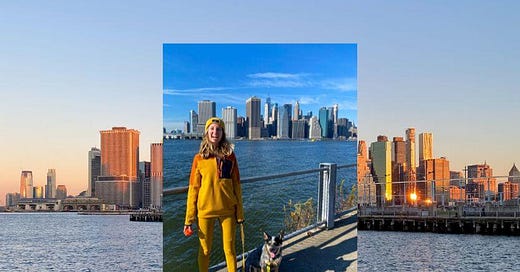An ode to big city dogs (and their people)
You are badasses—with equally incredible handlers—and we cheer so loudly for you.
We’ve spent the last several days visiting New York City.
Growing up in central Wisconsin, I thought any building greater than ten stories was capital-T Tall. (I couldn’t stop remarking at how huge everything felt when Sean brought me to Milwaukee shortly after we started dating.) While I’ve since grown better city legs, I’m still in awe of how many people and pets and restaurants and coffee shops and vendors and apartments and more can fit in a single block.
And my sense of wonder has nothing on my dog’s overwhelm in a tightly packed urban environment.
Scout’s been described as “shy” since she was found as a stray, and we’ve worked through a lot of fear and insecurity in our years together. But even after all this time—after all our shared accomplishments—walking her through busy NYC streets felt like another thing entirely. Kind of like the “final boss” level of our training, exposure, and confidence building.
It is wild to think that our “holy cow I can’t believe we’re handling this, did she just actually feel confident enough to play tug on the edge of a crowded off-leash park?!” experience is just plain daily life for so many owners who live here full time.
So far I’ve seen dogs prance by screaming garbage trucks without a care in the world. Pass other pets nose-to-nose without a trace of overarousal or reactivity. Nonchalantly watch bikes zoom mere inches from their tails. Ignore yelling strangers. Resist the urge to chase fat city squirrels. Relax on the subway.
So many remarkable things. Especially remarkable to me as 1) a self-proclaimed dog nerd who loves reading about what instincts come naturally to our companions, and 2) the owner of a sensitive dog who used to struggle with certain basic life skills even in a much smaller city environment (downtown Madison has nothing on Manhattan or Brooklyn).
Even before this visit I was a proponent that where we live with our pets affects why, what, and, how we train them. When you think about it, it seems obvious that many goals of someone on a multi-acre farm are naturally going to be different than those of someone living in a high-rise apartment, right? There are things we simply need to do with our dogs day in and day out—be able to safely take them outside to relieve themselves, be able to engage them in play and sniffing and other forms of fulfillment—that depend greatly on our surrounding environments.
And I think handlers have more options to address a behavioral problem (or even choose not to see it as an issue in the first place) if we can reliably control the stimuli we’ll see day in and day out… compared to if we live in a bustling metropolis and have to be prepared to encounter any- and everything even during the shortest bedtime bathroom break.
Basically, all else equal: A Scout Finch living in New York City is going to face a lot more challenges before breakfast than a Scout Finch living in our old suburban house might have in an entire day.
And while some dogs are naturally better suited to city life than others—I’m all about embracing our pets as individuals!—I think there’s also a lot of extra care and thought that good owners inherently put into having a dog in an urban setting.
Even though I knew environmental factors were a Huge Thing in training and lifestyle goals, it’s been eye opening all over again to see it firsthand. Oh how I’d love for us have more empathy for fellow dog lovers doing their best for the creatures in their care, regardless of where they live!
So this is my ode to the big city dogs and their big city owners. My shoutout to the people working incredibly hard to fulfill their pets in environments that might not be “ideal” for all those canine instincts… but that can indeed work with the right mixture of effort and management and training and love and creativity. I am cheering so loudly for you. I am so damn proud to know you.
And if anyone tries to judge you for choices you’ve made out of necessity in your immediate environment… working more directly through discomfort, making different advocacy decisions, whatever it may be… have I ever got your back.






